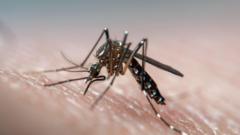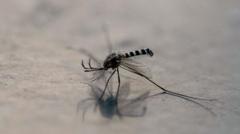The research proposes a novel solution to decrease populations of Aedes aegypti mosquitoes, known for transmitting various viruses impacting about 400 million people annually. Scientists conducted an experiment focusing on the genetic manipulation of male mosquitoes that aimed to render them deaf. This modification disrupts their ability to hear the specific wingbeats of female mosquitoes, a crucial component for their mating process which takes place mid-flight. By altering a genetic pathway involving a protein named trpVa, the male mosquitoes could no longer detect the alluring sounds of potential mates even after being in proximity for three days.
During their observations, the team noted the stark contrast in the behavior of the modified mosquitoes compared to their wild counterparts. While the wild males actively copulated multiple times and fertilized the majority of females in their environment, the genetically altered males were completely incapable of mating due to their lack of auditory response. Researchers deemed the results of this genetic manipulation as "absolute," claiming it eliminated the mating behaviors of the deaf males entirely.
Dr. Joerg Albert, a noted mosquito mating expert from the University of Oldenburg in Germany, acknowledged the study's significance. He indicated that targeting the acoustic perception of males could represent a promising avenue for mosquito control, although it requires careful management and further exploration. He highlighted the importance of sound for mosquito reproduction, warning that if males are unable to hear, it poses a risk of female mosquitoes potentially becoming extinct.
In addition to this genetic method of mosquito control, Dr. Albert mentioned the alternative approach of releasing sterile males in certain regions where mosquito-borne diseases are prevalent. Despite their disease-carrying capabilities, mosquitoes play an essential role in the ecosystem, serving as vital food sources for numerous animals and contributing to pollination.
During their observations, the team noted the stark contrast in the behavior of the modified mosquitoes compared to their wild counterparts. While the wild males actively copulated multiple times and fertilized the majority of females in their environment, the genetically altered males were completely incapable of mating due to their lack of auditory response. Researchers deemed the results of this genetic manipulation as "absolute," claiming it eliminated the mating behaviors of the deaf males entirely.
Dr. Joerg Albert, a noted mosquito mating expert from the University of Oldenburg in Germany, acknowledged the study's significance. He indicated that targeting the acoustic perception of males could represent a promising avenue for mosquito control, although it requires careful management and further exploration. He highlighted the importance of sound for mosquito reproduction, warning that if males are unable to hear, it poses a risk of female mosquitoes potentially becoming extinct.
In addition to this genetic method of mosquito control, Dr. Albert mentioned the alternative approach of releasing sterile males in certain regions where mosquito-borne diseases are prevalent. Despite their disease-carrying capabilities, mosquitoes play an essential role in the ecosystem, serving as vital food sources for numerous animals and contributing to pollination.





